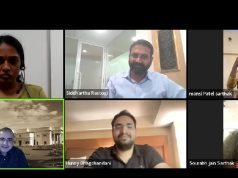Who are the Diversity Winners in the Pandemic Era?
Future workforces of organizations will be much more diverse than what they are today. Tomorrow’s workforce will include individuals of different genders, ages, races, ethnicities, and lifestyles. Effectively leveraging this human capital will play a large role in companies’ future competitiveness and economic performance.
If companies deprioritize Diversity & Inclusion (D&I) during the Covid-19 crisis, the impact is felt not just on the bottomline but also in people’s lives. Research and experience warn us that diverse talent can be at risk during a downturn for several reasons, including that downsizing can have a disproportionate impact on the roles typically held by diverse talent.
As companies experiment with remote and hybrid work shifts, this could reinforce existing exclusive behaviours and unconscious biases and undermine inclusion. In addition, unequal sharing of childcare and homeschooling responsibilities, and unequal availability of home workspace and access to broadband could be putting women and minorities at a disadvantage during this time of working remotely.
Benefits of D&I in this era
There is ample evidence that diverse and inclusive companies are likely to make better, bolder decisions — a critical capability in the crisis. For example, diverse teams have been shown to be more likely to radically innovate and anticipate shifts in consumer needs and consumption patterns — helping their companies to gain a competitive edge.
In this context, the shift to technology-enabled remote working since the Covid-19 pandemic hit, presents an opportunity for companies to accelerate building inclusive and agile cultures — further challenging existing management routines. With its benefits of increased flexibility, remote working can facilitate retention of women and minorities, who are often shouldered with a disproportionate share of family duties. It thus widens access to an array of diverse talent that may not have been available to companies previously.
Moreover, a visible commitment to I&D during the crisis is likely to strengthen companies’ global image and license to operate. In times of crisis, stakeholders typically interrogate a company’s purpose and values even more closely, potentially even more so in the current pandemic. Those that tap into the growing sense of solidarity that is a characteristic of the crisis — by reaffirming their commitment to I&D, supporting vulnerable talent who are at greater risk of infection, and reaching out to local communities — could strengthen employee motivation and win lasting approval.
D&I in India
Companies and their leaders can seize this moment — both to protect the gains they have already made, as well as to leverage D&I to position themselves to prosper in the future. The process is already in full swing worldwide, and India is catching up. One development on their frontier was the India Diversity Conclave held in April 2021. It was the first conclave of India Diversity Forum (IDF), a section 8 company formed to create awareness about diversity and inclusion.
The Conclave witnessed the support of over 50 companies as diversity champions and AGS Health and Skillsoft as Associate sponsors. Among them was Ankit Bansal, Founder and CEO of Sapphire Human Solutions, and on the Board of Advisors of IDF. He said, “IDF will work with its members to collectively raise the bar on D&I in India with a strong focus on achieving tangible, quantifiable results that lead to economic and social benefits to our members, industry and nation at large” while Dr Ritu Anand, Chief Leadership and Diversity Officer, Tata Consultancy Services — also an Advisor of IDF — stated: “When barriers of minds are removed, the economic success follows.”
Real world example: Sindhu Gangadharan

Since 2011, SAP has planned to increase women leadership by 25% in 2017 and 30 percent by 2022. Sindhu Gangadharan, Senior Vice President and Managing Director at SAP Labs India, is a testament to SAP’s advocacy on equality and inclusivity. An SAP long-timer and as the first woman to lead SAP Labs India, she is breaking the glass ceiling not only in the tech space but most importantly in India where women empowerment has just started to gain momentum.
Gangadharan started her career in the CRM Middleware space as a young developer in SAP Labs in Bangalore back in 1999 before moving to Walldorf in 2001. Uprooting her family in India and mastering the foreign language, she built her career in Germany for 18 years witnessing the growth and development of SuccessFactors, Fieldglass, Concur, Ariba, the cloud platform, S/4, and Digital Business Services. In 2019, Gangadharan was called for a leadership role back in SAP Labs India as Managing Director to replace another SAP veteran Dilipkumar Khandelwal.
Diversity Winner: Wipro
‘Begin Again’ is Wipro’s Inclusion and Diversity (I&D) initiative for women who are looking to relaunch their career post a break – be it for a sabbatical, motherhood, elderly care, travel, passion, or any other personal reasons. For the LGBTQ+ community at Wipro, the goal is to create a workplace and environment where they are welcomed, feel safe, treated with equal respect and acceptance and not subjected to bias. The company has a comprehensive framework “Pride” that guides their initiatives and programmes in this space — right from promoting an equitable workplace, reviewing existing policies, involving leaders, driving change through awareness sessions and engaging with the community and allies to build a strong network. Through their ERG, Wipro Pride aims to reinforce the importance of inclusion across the organization by creating a space where employees can share relevant information and best practices, meet other LGBTQ+ and Ally employees, discuss workplace concerns and more.
Diversity Winner: Accenture
Wherever possible, Accenture provides identical employee benefits to same-sex and opposite-sex partners. The company is leading change in the country with policies and benefits focused on the caregiver rather than marital status or gender. Partners of their LGBTI employees enjoy insurance benefits; transmen who can bear children can avail the 26-week maternity leave; and all secondary caregivers no matter their gender are eligible for paternal, surrogacy and adoption leave. The company is also breaking barriers with programmes like the Accenture Inclusive Internship, which is all about hands-on experience and relevant work experience to build future careers for young transgenders and other marginalized youth.
For people with visible and invisible disabilities, Accenture is thinking accessible—whether it’s deploying assistive technologies or providing reasonable accommodations with workplace adjustments and transport arrangements. Currently, 75% of the company’s applications are accessible. With programmes like Abilities Unleashed, Accenture is helping PwD (persons with disabilities) employees explore career opportunities they may not have considered before and become authentic leaders and role models.
Inclusive hiring in hospitality
Organizations in the hospitality industry like Lemon Tree, InterContinental, Sarovar and ITC have identified suitable roles basis the disability in Food & Beverage (F&B) service, housekeeping, security, laundry, concierge through various NGOs across the country. Big Bazaar too is closely connected with various NGOs that work with PwDs. These NGOs become the recruitment pools from which Big Bazaar hires. Jubilant Food Works runs the ‘Inclusive Employment Programme’ for PwDs. Till date, they have recruited more than 200 people having hearing and speech impairment across the country in their restaurants.
McKinsey & Company, in their report ‘Diversity Wins’, took a close look at the companies in their data set that are achieving higher levels of diversity — and benefitting from an increased likelihood of financial outperformance. The common thread for these diversity winners is a systematic approach, together with bold steps to strengthen inclusion.
Not only do diversity winners articulate a bespoke, business-driven case for D&I change and set themselves general representation targets, they also thoughtfully consider what forms of multivariate diversity to prioritize, and why. They focus on advancing various forms of diverse talent specifically into executive, line-management, technical and board roles — not only addressing leadership appointments but also fixing the ‘broken rungs’ of the corporate ladder along the way.
This article appears in the January 2022 magazine by The CSR Journal. To grab your copy, click here












